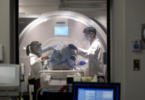For many of the pregnant women I see every day, receiving an ultrasound is exciting. The test is an opportunity to get a glimpse of your baby and can make what’s ahead seem more real. It can also provide reassurance that the pregnancy is going well and your baby is developing.
Ultrasounds requested by your family doctor, midwife or obstetrician transmit high frequency waves through your uterus. These waves bounce off the baby, returning echoes that transform into images on a screen and show the baby’s anatomy, position and movements. Most health care providers will order an ultrasound between 18 and 22 weeks of pregnancy. Sometimes there is an earlier ultrasound, or a later one if you are close or past your due date, or if your baby is having an assessment for a specific reason (such as a low placenta).
Ultrasounds are performed by sonographers, technicians who have special education and credentials. The sonographer will not interpret your ultrasound results, they will be reviewed by a radiologist who is trained in reading ultrasounds. Special ultrasounds may be required in some pregnancies; these are often performed by a physician trained in ultrasound for babies, also called a maternal fetal medicine specialist.
Over the last couple of years, I’ve heard more and more about “keepsake” or “entertainment” ultrasound clinics. These private clinics don’t require a referral from a health care professional and, for a fee, provide an ultrasound that produces a “4D video” or 3D images. I’ve had patients tell me while the medical ultrasound is great, they are craving more glimpses of their baby to strengthen their bond before birth.
While the idea of another opportunity to see your baby before birth may sound appealing, the Society of Obstetricians and Gynaecologists of Canada, Health Canada and the FDA in the United States, have all urged parents to avoid exposing their unborn babies to fetal ultrasound for non-medical purposes.
Here are the reasons you should not have a non-medical ultrasound:
- Possible risk to baby: While ultrasound has been used in pregnancy for many years, and research shows that sound waves are safe, experts agree that the procedure should not be done without clear medical reasons. Ultrasounds should be limited to the minimum needed to make a diagnosis.
- Operators may not be adequately trained: Operators at the for-profit ultrasound companies may not be sufficiently trained to understand safe levels of abdominal pressure and fetal maneuvering.
- False negatives: Operators may not notice fetal abnormalities when scanning, unlike qualified professionals that your doctor or midwife will refer you to.
- Lack of regulation: As the clinics don’t fall under Ontario’s Ministry of Health and Long-Term Care, there are no regular inspections to monitor infection prevention, equipment or staff training.
Remember you’ll have plenty of chances to take photos of your baby once he or she is born. Until then, try to enjoy your pregnancy and please avoid non-medical ultrasounds. You’ll have many opportunities to make memories once they are born!








